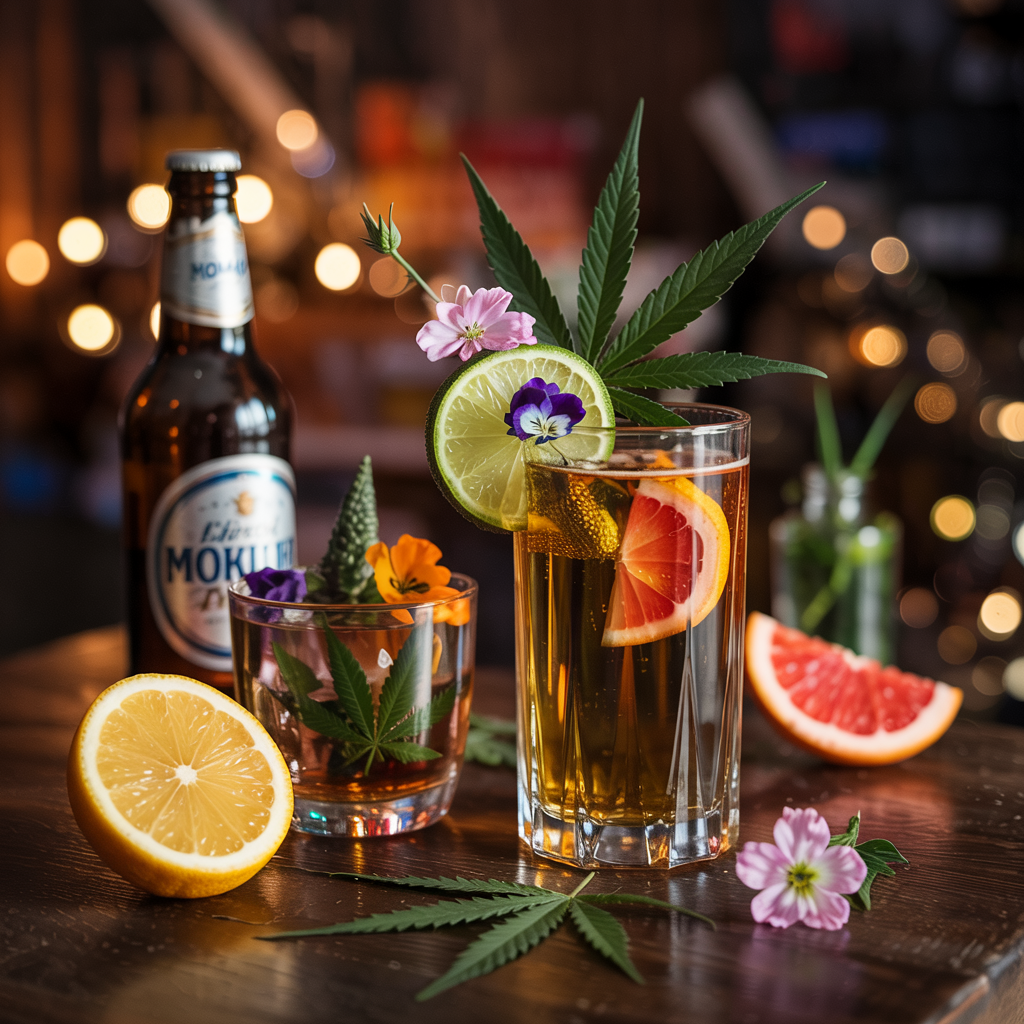Cannabis beverages are redefining social consumption by merging innovation, wellness, and opportunity across two historically separate industries.
Historically, cannabis and alcohol have occupied distinct consumer spaces, each with separate cultural implications and regulatory pathways. Yet shifting cultural norms, emerging market demands, and evolving consumer preferences have propelled these two titans toward unprecedented collaboration. At this intersection lie cannabis beverages—a category brimming with opportunity, innovation, and regulatory complexity.
Recent trends indicate younger generations increasingly choose cannabis products over traditional alcohol options. According to the National Institute on Drug Abuse, cannabis vaping among college students rose dramatically—by approximately 169%—from 2017 to 2019. Meanwhile, alcohol sales, specifically wine and spirits, dropped about 3% in 2023 alone.
This cultural pivot extends beyond simple intoxication. Today’s consumers prioritize wellness, mindfulness, and functional benefits, driving demand for products that promise relaxation without the negative side effects of traditional alcohol. Cannabis beverages address this precise need by offering controlled dosing, transparency, and wellness-focused experiences, aligning perfectly with the lifestyle goals of younger demographics.
The convergence of cannabis and alcohol industries signals substantial financial opportunities. With the global cannabis beverages market valued at approximately $1.16 billion in 2023 and projected to grow at an annual rate of over 19%, the incentives for both cannabis producers and traditional alcohol companies are clear.
For alcohol companies experiencing declining sales, cannabis beverages represent an essential diversification strategy. Conversely, cannabis companies see beverages as a means to mainstream acceptance, creating discreet, dose-controlled products that appeal to broader audiences. Businesses like Lume Cannabis exemplify market adaptability, preemptively managing tariffs by stockpiling materials—a strategy illustrating the industry’s resilience.
Innovation drives the cannabis beverages sector. Companies continuously explore advanced technologies such as nanoemulsions—accelerating THC absorption—and craft cocktail flavor profiles that mimic familiar alcoholic beverages without the associated downsides. Brands such as Nowadays have carved a niche by marketing THC-infused drinks explicitly as alcohol alternatives, emphasizing rapid onset, controlled dosing, and health-conscious ingredients.
Sustainable packaging and precise formulations also demonstrate the industry’s focus on both environmental responsibility and consumer experience, further distinguishing cannabis beverages from traditional alcohol products.
Navigating the Regulatory Landscape
One of the most complex challenges facing cannabis beverages is the fragmented regulatory environment. States differ dramatically in their approach: California explicitly bans co-selling cannabis and alcohol, whereas Minnesota and Illinois allow limited hemp-infused beverage sales. These varying state regulations require companies to devise adaptable business models, often tailored to the most restrictive state requirements, complicating national expansion strategies.
Federal cannabis prohibition significantly complicates market growth and stability. Despite legalization for medical or recreational purposes in 38 states, marijuana remains a Schedule I substance under the Controlled Substances Act. This classification restricts banking access, prevents interstate commerce, and leads to inconsistent quality and safety standards. Cannabis beverage producers must thus navigate an intricate web of state taxes, labeling requirements, and advertising constraints, disproportionately affecting smaller operators.
Compliance extends well beyond mere legal formality; it’s essential for consumer trust and brand longevity. Regulations, like California’s ABC guidelines, explicitly prevent cannabis consumption at licensed alcohol establishments and prohibit alcoholic beverages containing THC. Packaging must simultaneously meet stringent child-resistant standards while maintaining consumer appeal and sustainability. Mastery of these complexities remains pivotal for brands seeking sustained market presence.
Effective Market Entry Strategies
Identifying states with favorable regulatory landscapes and affluent consumer bases—such as Michigan and Massachusetts—is critical. Conducting extensive local market research, collaborating with regional dispensaries, and partnering with local wellness influencers can establish early credibility and market share. Regional strategies prove particularly effective where national marketing efforts face regulatory and cultural barriers.
Given the unpredictable regulatory landscape, adaptability is crucial. Companies employing flexible operations, like Nowadays’ asset-light models or strategic stockpiling to manage supply chain disruptions, demonstrate how proactive planning can mitigate risks. Adaptability allows brands to swiftly pivot amid regulatory shifts without compromising product quality or consumer expectations.
Establishing a trusted, distinctive brand remains paramount. Successful cannabis beverage companies prioritize transparent potency testing, sustainability initiatives, targeted lifestyle branding (such as fitness-friendly formulations), or culturally resonant messaging (e.g., LGBTQ+ inclusive campaigns). Educational content about cannabinoids, dosing, and benefits further enhances consumer engagement and loyalty.
Consumer Trends and Competitive Landscape
Health-conscious consumers increasingly prefer cannabis beverages due to perceived therapeutic advantages such as stress relief, sleep enhancement, and pain management. Positioning infused drinks as functional wellness products rather than recreational alternatives significantly broadens their appeal, aligning them with current holistic lifestyle trends.
In a rapidly evolving market, innovation carries inherent risk but also high rewards. Brands pioneering water-soluble THC formulations or adaptogen-infused beverages may capture niche markets, provided they maintain stringent quality control and rigorous product testing. Notably, a 2015 study highlighted increased THC absorption when combined with alcohol, underscoring the necessity for clear consumer education regarding product effects and dosing guidelines.
Currently, no single brand dominates the cannabis beverages landscape. This absence presents substantial opportunities for innovative startups and strategic mergers. Analysts anticipate eventual consolidation, mirroring historical patterns seen in the alcohol industry. However, delayed federal legalization maintains the market’s current fluid state, allowing smaller craft brands temporary opportunities for significant impact and growth.
Structuring Successful Partnerships and Mergers
Cannabis and alcohol companies contemplating mergers face rigorous due diligence. Alcohol firms must evaluate cannabis companies’ financial health, regulatory compliance, and market potential carefully. Cannabis entities, conversely, navigate intricate compliance checks under federal alcohol regulations, necessitating detailed assessments to avoid prohibited cross-ownership structures.
Transparent business practices remain critical in managing risk. Clear, adaptable contracts anticipating regulatory adjustments, federal rescheduling possibilities, and potential market restrictions ensure resilient partnerships. Conducting thorough supply chain audits and embracing ethical sourcing standards further mitigate reputational risks, essential for long-term viability.
The Future of Hemp-Infused Beverages
Despite regulatory challenges, experts forecast strong, sustained growth for cannabis beverages, propelled by evolving consumer acceptance and innovative product diversification. Emerging categories—including terpene-enhanced waters and THC-infused mocktails—underscore the sector’s creative potential. International markets, notably Canada and Germany, offer additional growth avenues for U.S.-based companies navigating domestic constraints.
Federal prohibition remains the predominant barrier to large-scale industry mergers and national expansion. Until Congress enacts comprehensive cannabis reform, major alcohol corporations will likely limit investments to hemp-derived THC products, avoiding direct involvement with marijuana. Consequently, cannabis beverage innovation thrives primarily within federally compliant niches.
Continued innovation remains fundamental. Technologies like blockchain for transparent seed-to-sale tracking and AI-driven flavor optimization represent future developments capable of revolutionizing cannabis beverage production. Simultaneously, consumer education initiatives addressing misconceptions about cannabinoids will facilitate broader societal acceptance.
As cannabis beverages redefine traditional boundaries between alcohol and cannabis markets, stakeholders must navigate complex regulatory, consumer, and innovation landscapes. Ultimately, success in this evolving industry requires balancing ambitious innovation with cautious adaptability, fostering products and experiences aligning deeply with contemporary consumer desires

***
GreenPharms is more than just a dispensary. We are a family-owned and operated company that cultivates, processes, and sells high-quality cannabis products in Arizona. Whether you are looking for medical or recreational marijuana, we have something for everyone. From flower, edibles, concentrates, and topicals, to accessories, apparel, and education, we offer a wide range of marijuana strains, products and services to suit your needs and preferences. Our friendly and knowledgeable staff are always ready to assist you and answer any questions you may have. Visit our dispensaries in Mesa and Flagstaff, or shop online and get your order delivered to your door. At GreenPharms, we are cultivating a different kind of care.
Follow us on social media





